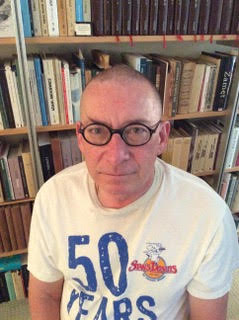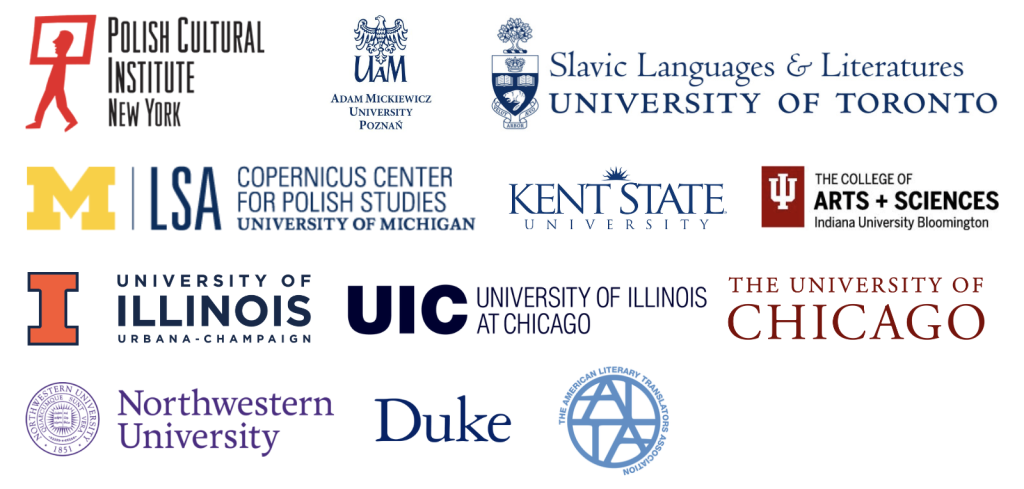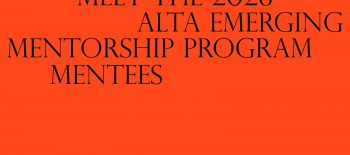March 1, 2022
Episode 14 and all video recordings are available at:
Polish Cultural Institute New York YouTube
Encounters with Polish Literature is a new video series for anyone interested in literature and the culture of books and reading. Each month, host David A. Goldfarb will present a new topic in conversation with an expert on that author or book or movement in Polish literature. More about the Encounters with Polish Literature series and the timeline.
The Polish Sejm or parliament has declared 2022 The Year of Polish Romanticism, and this month we are looking at Poland’s greatest Romantic poet, Adam Mickiewicz, the author of the national epic, Pan Tadeusz, the ever controversial drama The Forefathers’ Eve, and numerous collections of lyric poetry among other works.
We begin this episode by placing Polish Romanticism on the map of European Romanticism in the nineteenth century, considering commonly held philosophical concepts like Organicism and the Sublime, figures like the Byronic hero or the outsider, and looking at the way that Polish independence during the era of the partitions was a cause célèbre in Romantic literature and discourse across Europe.
Adam Mickiewicz (1798-1855) was born to a family of the petty gentry in Nowogródek in what had been the Grand Duchy of Lithuania, today Navahrudak near Grodno in Belarus. He studied at the University of Wilno, where he became involved with clandestine groups, the Philomaths, and the Philareths, inspired by Freemasonry and the progressive philosophers of the Enlightenment and patriotism to the cause of independent Poland. This activity led to his arrest by the Russian authorities, leading to an exile from his homeland that ironically led him to the elite cultural salons of St. Petersburg where he met Pushkin and eventually traveled to Crimea where he wrote the Crimean Sonnets. His Russian connections and natural charisma would lead him to elite cultural circles in Italy, Switzerland, and Paris, where he became a major European intellectual in his own day. His Ballads and Romances (1822) are often seen to mark the beginning of Romanticism as a literary movement in Poland.
In this episode we look at his early poem, “Romantyczność” (“The Romantic”) that could be consider a manifesto of Romanticism. We consider some aspects of his biography. We take a look at new translations of the Crimean Sonnetsby Kevin Kearney, and we read a few fragments of Bill Johnston’s recent translation of Pan Tadeusz. If you pay attention to the whole episode, you can see how the famous opening verse of Pan Tadeusz emerged from Rousseau’s treatise “On the Government of Poland.” We also discuss the uses of orientalism in Polish Romanticism. We look briefly at the controversy over a recent production of Forefathers’ Eve, part III, as a mirror to two images of Mickiewicz, as a great European intellectual and as the Polish national bard. For students interested in studying Polish at UCLA, Prof. Roman Koropeckyj gives a brief overview of the program.
Selected works by Adam Mickiewicz:
Adam Mickiewicz, 1798-1855: Selected Poems. Ed. Clark Mills. Intro. by Jan Lechoń. New York: Noonday Press, 1956.
“Crimean Sonnets.” Tr. Kevin Kearney. Cardinal Points, 11 (2021), Ed. Boris Dralyuk, pgs. 143-63.
Mickiewicz, Adam. “Forefathers’ Eve, part III.” Tr. Count Potocki of Montalk. In Polish Romantic Drama: Three Plays in English Translation. Harold B. Segel, ed. Ithaca, N.Y.: Cornell University Press, 1977.
Mickiewicz, Adam. Forefathers. Translated into English verse by Count Potocki of Montalk, with a foreword by Wiktor Weintraub. London: Polish Cultural Foundation, 1968. (Search in your local research library or try Interlibrary Loan)
Pan Tadeusz: The Last Foray in Lithuania. Tr. Bill Johnston. New York: Archipelago Books, 2018.
Additional Resources:
Koropeckyj, Roman. “Adam Mickiewicz“. The Literary Encyclopedia. First published 26 July 2011. (subscription required, usually through a university library)
Adam Mickiewicz: The Life of a Romantic. Ithaca, N.Y.: Cornell University Press, 2008.
Pan Tadeusz. World Epics (website). Columbia University.

Roman Koropeckyj is a professor in the Department of Slavic, East European, and Eurasian Languages and Cultures at the University of California, Los Angeles, where he’s been teaching since 1992. He received his BA in Comparative Literature at Columbia University in 1976 and his PhD.in Slavic Language and Literatures at Harvard University in 1990. Koropeckyj is the author of two award-winning books on Adam Mickiewicz, The Poetics of Revitalization: Adam Mickiewicz between Forefathers’ Eve, part 3, and Pan Tadeusz (2001) and Adam Mickiewicz: The Life of a Romantic (2008) (published in Polish as Adam Mickiewicz: Życie romantyka in 2013), as well as a number of articles on Polish, Ukrainian, and Little Russian literatures. He is currently at work on a study about the life of the eighteenth-century Ukrainian bandit Semen Harkusha and stories about him.
Lead image: Walenty Wańkowicz, Portrait of Adam Mickiewicz on Ayu Dag Cliff, 1827-28. Source: National Museum in Warsaw.
Bartek Remisko, Executive Producer
David A. Goldfarb, Host & Producer
Natalia Iyudin, Producer




